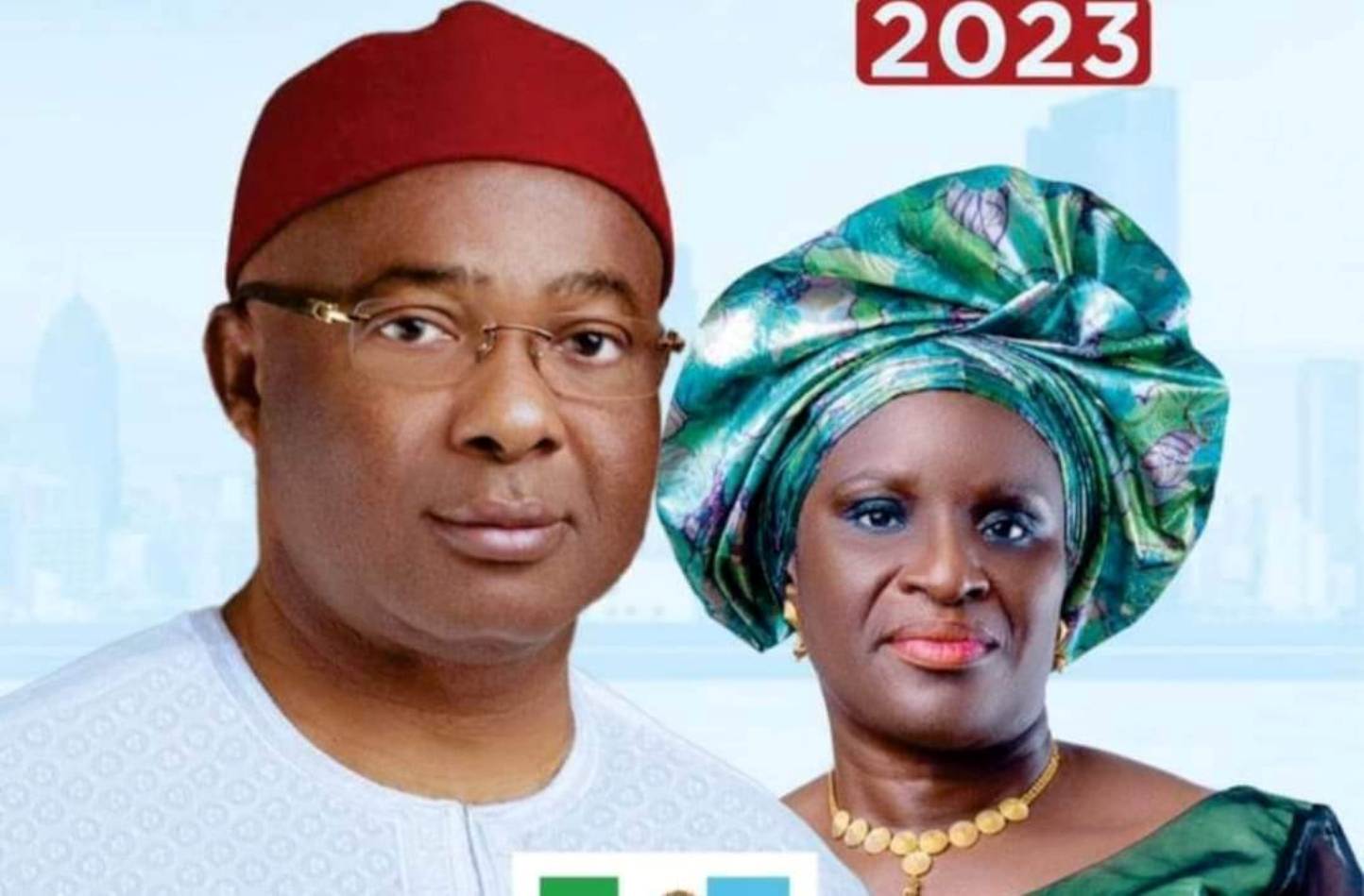Open branches weekend, expect clearer directive todaylPoS operators ignore CBN warning on selling banknoteslExperts in divergent view on implementation, impact
The banking industry was in disarray over implementation of the directives of the Central Bank of Nigeria, CBN, on collection of the old banknotes in the denominations of N500 and N1,000 during the weekend.
The apex bank was said to have directed the banks to collect the old banknotes which it had declared non-legal tender with effect from February 10,2023, prompting the banks to not only issue mails to customers to come and deposit their old notes but actually began to collect the old notes. The commercial banks also sent out emails to their customers on Friday, re-opening their branches last Saturday after suspending weekend banking previous weekend with the deadline of old notes acceptance.
However, with a statement from the CBN late Friday denying the alleged directive to collect old notes, some of the banks suspended the collection of old notes while others did. Also some of the banks failed to re-open while a few did.
Meanwhile, despite President Muhammadu Buhari’s directive that the CBN should re-circulate the old N200 notes, the operators in the financial system weekend indicated that the situation will persist throughout this week into next two weeks, and may only begin to ease after the elections.
The anger and frustrations among banks customers across the country continued as many of them are locked out of bank premises, just as most Automated Teller Machines, ATMs, remain without cash.
Only branches located in complexes such as hotels, or large malls with tight security operated freely. Almost all stand-alone branches were locked to customers.
Some banks sent armed security personnel to their gates to either turn back customers by telling them that the bank is not open for customers or screen customers who had other transactions apart from withdrawing cash.
However, others completely closed for fear of being attacked for failing to provide the new Naira notes.
Besides cash deposits, other customers were either making transfers or cheque deposits.
For some banks, their ATM galleries were shut to the public.
Financial Vanguard also discovered a surge in the number of customers requesting debit cards and those seeking assistance to sign up to the banks’ Mobile Apps as the customer care sections were overwhelmed with crowds.
Major markets and shops in Lagos shut down activities last Friday due to crisis emanating from inability to spend the old N500 and N1,000 by Nigerians still in possession of the old naira notes.
Market traders were divided as some traders were collecting the old N500 and N1,000 at a cost by increasing the prices of their wares while others rejected them.
As a result of the confusion among Nigerians, most commercial drivers parked their vehicles, making commuters stranded at the bus stops, even as available transporters increased fare prices.
Old/new notes confusion spreads
There was also confusion across the country over the weekend as the extended deadline for the return of old N500 and N1000 notes lapsed.
The CBN had announced that it would receive the affected notes until February 17, 2023, after which they would be required to undergo certain processes before going to the CBN to have the old notes accepted for deposits.
However, Financial Vanguard learnt that some members of the public who went to the apex bank to deposit their money were turned back, apparently due to their inability to fulfill the requirements.
The reason advanced by CBN staff was that only depositors with N500,000 and above were to take their old notes to CBN. Those with less were asked to take their old notes to their banks.
At the Deposit Money Banks (DMBs), however, there was confusion as some banks refused to accept such deposits, while others did.
Financial Vanguard learnt that the confusion emanated from the CBN’s conflicting communications.
Virtually all DMBs had stopped accepting deposits of old notes since February 10, 2023.
In the midst of the confusion and anger, some DMBs issued memos to their customers who had the affected old notes to come forward and deposit them.
Before the close of work, whoever, that position was countered by a CBN statement, which denied any directive, asking members of the public to continue to deposit their old notes with their banks.
Bank customers, Friday, flooded the banks to deposit their old N500 and N1,000 notes following news that the Central Bank of Nigeria (CBN) had directed Deposit Money Banks to resume collection of the old notes.
Findings also showed that some businesses, including Point of Sales, PoS, operators and transporters still collected the old notes while others rejected them.
For commercial buses some operators said to passengers: “If you don’t have the new notes, don’t enter the bus.” Some others didn’t make any prior announcement and they collected both new and old notes.
A PoS operator in Ojuelegba bus stop, in Lagos, told our correspondent, “It is not quite long that we received information that we can collect the old N500 and N1,000 and take to our bank after we have filled a form the Central Bank of Nigeria, CBN has on its website. We are collecting it. Only that the CBN has said we must not deposit more than N500, 000.”
But most traders were not aware of this development as they had shut down earlier.
A trader in one of the markets in Lagos Island, Mrs. Grace Faleke, said the shops were locked by some traders out of fear of unrest going on at Mile 12 and Ojota areas of Lagos, adding that the market entrance were locked because some people who brought old notes to purchase goods and were refused threatened to fight.
She added that the rioting and fighting at Mile 12, Ojota and other places made some of the shop owners to close down and go back home.
Faleke said: “We have heard that they are fighting in different locations in Lagos, so as a result, most of the traders locked their shops and went home.
PoS operators defy CBN’s threat
Findings also showed that PoS operators continued to sell Naira at N200 and N300 to N1,000 for old and new Naira notes respectively despite the CBN threat to arrest them for such deals which, according to the apex bank, is completely outside their license mandate.
Meanwhile, at the backdrop of the cash crises, the PoS businesses have slowed down as many agents locked their outlets in search of cash.
Financial Vanguard discovered that most PoS agents had to now carry out part transactions and complete delivery of the full amount requested by customers in later days due to the scarcity.
Others had to stay out of business till the situation improves.
Mrs. Adebisi Makinde, a PoS agent at Igando area of Lagos, said, “I have been out sourcing for cash to run today’s business. Despite my running round I was able to gather only N70,000 in denominations of N200.
“This is because after the CBN issued a strong warning on selling and buying of the naira most of our sources have stopped giving the cash out while many had gone to deposit it in their accounts.
“This week I had to pay part of the withdrawal to some customers and asked them to come for the rest the next day.”
One of our correspondents who posed as a potential new Naira buyer was told by a POS, in Abuja, at the weekend, that she would sell her N10, 000 at the cost of N, 4000.
After much negotiation, she later changed her mind and told our correspondent that she bought the currency from someone at N3000 and due to that she would no longer sell the notes as she was saving them in case the scarcity got worse.
She claimed that some bank staff from the Banks Avenue in Area 3, Garki, Abuja, had to come out to the PoS operators to look for cash, as they claimed that they had not received new notes for at least three days.
Speaking with a PoS agent who operates at Federal Housing Authority, Lugbe, also in Abuja, he disclosed: “For two weeks now, I have not been able to get cash, so I am using this period to do other businesses.
“I can’t go through what my colleagues are going through. How can someone go to the bank at 8 a.m and leave the bank at about 4 p.m with only N5,000? I can’t do that.”
But another PoS agent, Madam Oliyonpan Angela, said that the business of PoS is her life and she cannot do without it.
Angela said, “ I love this business, because it is a good business, I am really making it, this is my season. I go to Garki every midnight to withdraw money from the ATM because most people go home to sleep at that time.”
Commenting as well, another POS operator along the same axis said: “There is no cash and the little we have we still buy them. So that is why we charge N200 for N1,000 for old notes and N300 for N1,000 new notes.
Most of the PoS outlets were closed for the day due to unavailability of cash as they had dropped their money with their banks, while those that opened were either not attending to customers due to lack of cash or paying with old notes. Those paying with old notes believed that since the CBN has allowed the banks to continue to collect the old notes, they (old notes) remained legal tender.
Meanwhile, the PoS operators have reduced their withdrawal charges to about four per cent following the wide spread rejection of the old notes. Withdrawal of N5,000 old notes now attract N200 charges.
National President, Association of Mobile Money and Bank Agents in Nigeria, AMMBAN, Mr. Victor Olojo, reiterated the lack of involvement of PoS operators and agents in the distribution of new notes.
He stated: “It has been quite challenging for us. We have really not had access to cash all these times. We have been challenged in all ways. We have not really gotten the cooperation of CBN in terms of working closely with PoS agents.
“We have been pushing, we have consistently worked to see how we can help Nigerians out of this challenge that we are experiencing right now and we are happy to hear that CBN has also directed banks to start collecting N500 and N1,000 old notes. That will also go a long way in trying to solve the issue on ground.”
Implications — Experts’ insights
Speaking to Financial Vanguard on the implications of the latest drama in the monetary space, Prof Uche Uwaleke, President, Association of Capital Market Academics of Nigeria, ACMAN, said: “I am in agreement with the President’s directive to re- circulate N200 notes to ease cash scarcity. The CBN should generally ensure increased supply of lower denominations as well as increase cash withdrawal limit to at least N100,000.
“More PoS machines should be procured especially by petroleum marketers/petrol filling stations as many currently in use are malfunctioning.”
Responding, Head of Research and Investment ay Fidelity Securities Limited, Victor Chiazor said:”
The issue around the Naira redesign and currency swap program has become more political as against being a monetary tool for managing the economy. Unfortunately, these activities will have serious implications on the economy at large as we expect GDP growth figures for Q1’2023 to be negatively impacted as economic activities have significantly been hampered.
“The seeming stability being experienced in the equities market is largely as a result of the significantly lower percentage of foreign participation in the equities market which stood at 10.81% in December 2022 against 89.19% for domestic players; else we would have seen a high level of sell-off form foreign players in the market. For the sake and benefit of the broader economy, we hope that the parties involved will stop heating up the polity and run with the president’s position on the matter.”
Managing Director, APT Securities & Funds, Mallam Garba Kurfi said:”The naira redesigning is a programme introduced to us which may bring down economic growth due to lack of cash. The Extension of N200 note to 10th April may not resolve the situation since that constitutes only 8% of money in circulation which is a drop in the Ocean.”
Speaking, Ejike Nwuba, CEO, RenaissanceAfrica, described the policy as a welcome development, saying that it is healthy and necessary for the development of Nigeria’s economy.
He said: “The naira swap is being sabotaged by enemies of the progress of this country, but against all odds — we must embrace it in our best interest.
“As the Chinese says “strong medicine is bitter”. The implementation may occasion some hardship in the short term, but its future consequences will be tremendously beneficial to our country.”
Jideofor Akpa, a business man, who also spoke in support of the policy, cautioned Nigerians to stop making excuses over their failure to deposit their old notes, saying that the CBN gave ample time to allow people return the old notes to the banks.
“It is almost four months since the policy was announced. That is ample time to get banked or to deposit what you have in your possession.
We need to stop making excuses for ignorance.
“I went to Ogun State by road and in traffic, I saw a hawker selling gala and drinks still clutching wads of old naira notes. When I asked her why, she said, “the governor said the money is still good”.
“The one disenfranchising these simpletons are the state governors deceiving them into believing they can usurp federal laws and edicts,” Akpa said.
The Director, Centre for the Promotion of Private Enterprise (CPPE), Dr Muda Yusuf, said that the address by the President will not materially change the situation.
He stated: “200 naira currency denomination is less than 10 percent of the value of currency notes in the economy. The N500 and N1000 notes constitute about 80% of the naira notes.
“The way out of this currency conundrum is for the president and the CBN to comply with the orders of the Supreme Court on this matter. Any other measures would be cosmetic, at best.
“The CBN act specifically stated that reasonable time must be given for any currency swap programme. Three months cannot be said to be reasonable time for a country of over 200 million people, a large informal economy and a vast rural economy.”



